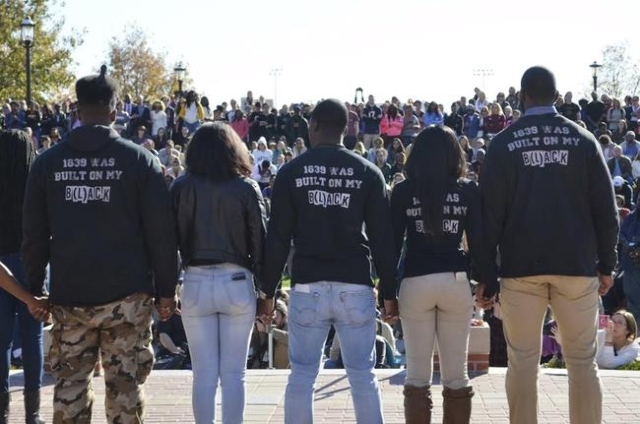Vegas university community tips cap to Missouri, talks local issues
This week’s events at the University of Missouri haven’t gone unnoticed by staff and students at colleges in the Las Vegas Valley.
Sparked by a hunger strike, hundreds of protesters and a proposed football boycott, Missouri students’ successful ousting of University of Missouri System President Tim Wolfe has Las Vegas students and college staff feeling both surprised and empowered.
“We’re very happy and pleased that students actually have a democratic role in how they’re governed in their own institution,” said Victorlee Boardley, vice president of the Black Student Association at the College of Southern Nevada. “That’s a great thing, and it sure felt good to see.”
Boardley, a sophomore studying communications, is one of nearly 20 CSN students and dozens more University of Nevada, Las Vegas students planning a commemoration of this week’s events in Missouri on local college campuses. While CSN’s organization held its first meeting of the school year on Monday — the day of Wolfe’s resignation — the group is holding a special event Monday, Nov. 16, to celebrate what Boardley called “a little justice.”
“It’s about time, because things like that have been going on for years and years,” he said.
Brianna Sanders, a junior in UNLV’s college of engineering and member of the school’s chapter of the Alpha Kappa Alpha black sorority, praised Missouri students and staff for “giving the underdog a voice.”
“It shows administrators can’t ignore students of any color,” Sanders said on Friday. “You have to respect everybody or else there are consequences.”
But while some staff and students’ are pleased with changes at the University of Missouri, they acknowledged Las Vegas is a different university scene with its own set of challenges.
Dr. Brandon Manning is one of three African-American studies professors at UNLV. Manning, who was raised in Atlanta and earned his Ph.D. at The Ohio State University, said UNLV’s ranking as the nation’s second-best school for ethnic diversity helps reduce the high level of institutional racism faced by students of color at traditionally white schools, like Missouri.
Only 14 percent of students enrolled at UNLV graduate in four years or fewer, Manning said, compared to about 36 percent percent nationwide. Twenty-one percent of Las Vegans age 25 and older have college degrees, compared to almost 32 percent of all Americans, according data from the 2010 U.S. Census.
Lower graduation numbers in Las Vegas often reinforce a stereotypical belief, especially for black and Hispanic students, that they don’t belong at post-secondary school, Manning said.
“For so many students — students of color more broadly — the university space is still a space that they don’t inherently see themselves as a part of,” he explained.
Las Vegas’ history of racial segregation, which lasted in full-force through the early 1960s, suggest the city hasn’t always been the most civil rights-friendly, either, Manning said.
He wishes UNLV offered more courses on the history of local race relations, and also payed more attention to gender and social class.
“Race, gender, class, just really making sure that kind of work is happening for every college student,” Manning said. “Otherwise you’re going to have this systemic racism and oppression that permeates itself everywhere.
“Unfortunately our program is extremely small and we’ve been stripped to the bare minimum,” he added.
Lonnie Wright, professor of hospitality management at CSN, agreed with Manning, expressing his own desire to expand higher education on topics of race and social class at Nevada's largest community college.
Wright, a black entrepreneur who has taught at CSN for over 20 years, said he wasn't aware of any social sciences classes offered on race or class.
According to its curriculum, CSN includes race, gender and social class in some Women's Studies and Latin American Studies program courses. One history class, titled "The African American Experience," is described as a "survey of the history of African Americans from their origins on the west coast of Africa to the present."
“We need to make sure any DNA of racism in Las Vegas is gone,” Wright said. “It’s important that everybody knows and understands the challenges our community has faced here, and still faces today.”
Besides adding classes, interviewed UNLV students and staff said they’d be interested in changing UNLV’s “Hey Reb” mascot, eliminating what they called "ties to the Confederate States from the Civil War era."
Once dubbed the “Mississippi of the West” in a 1950s magazine article, Las Vegas called the city’s first university mascot Beauregard, after the infamous Confederate Army general.
“Obviously, it was a reference to the Confederacy,” Manning said.
The name was changed in the late 1970s, and debuted in the early 1980s as "Hey Reb." With the recent momentum at the University of Missouri, UNLV, its students and student-athletes have the power to change it again, Manning and Sanders said.
“I think we’re either for equality, or we’re not,” Sanders said.
Contact Chris Kudialis at ckudialis@reviewjournal.com or 702-380-4593. Find him on Twitter: @kudialisrj

















